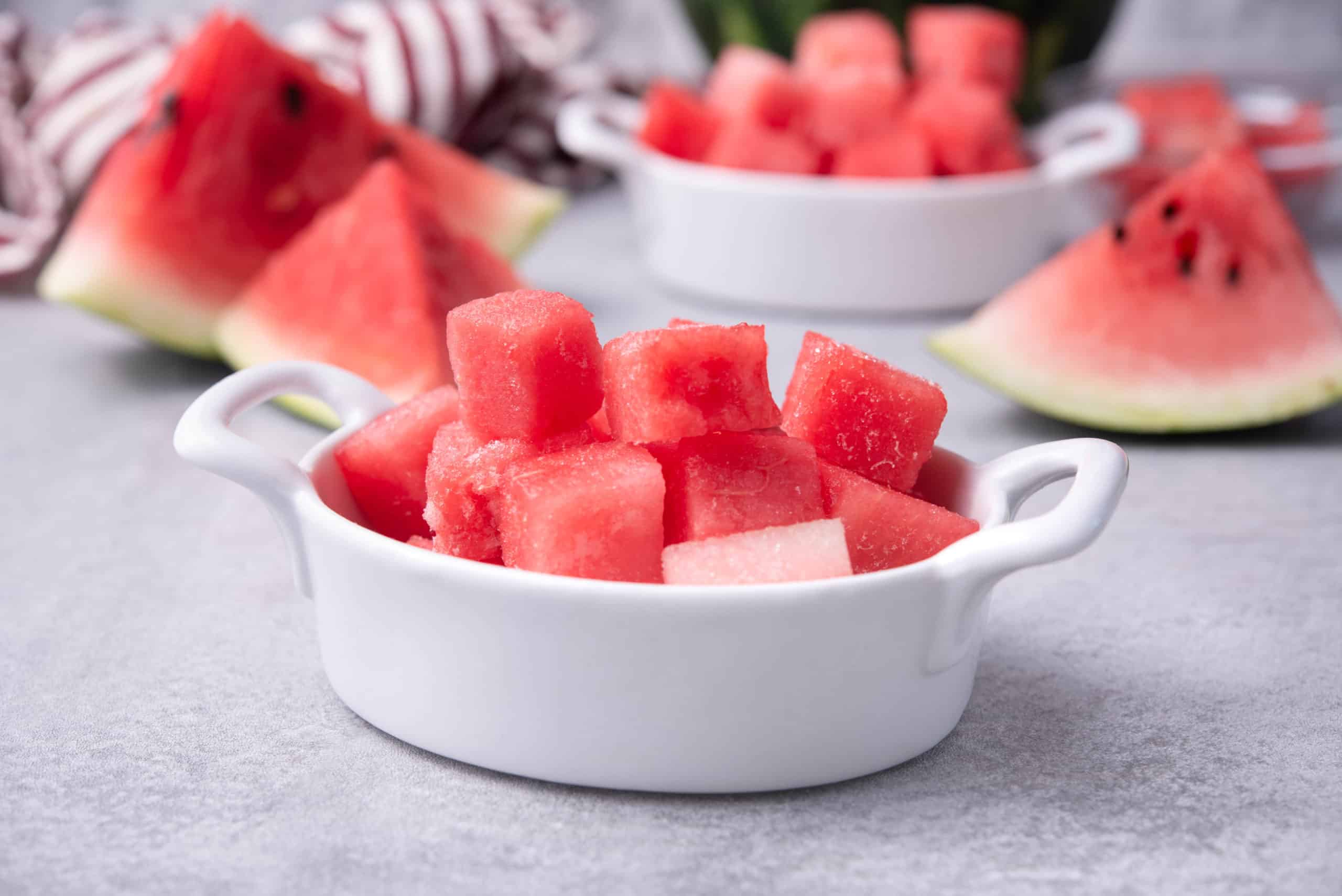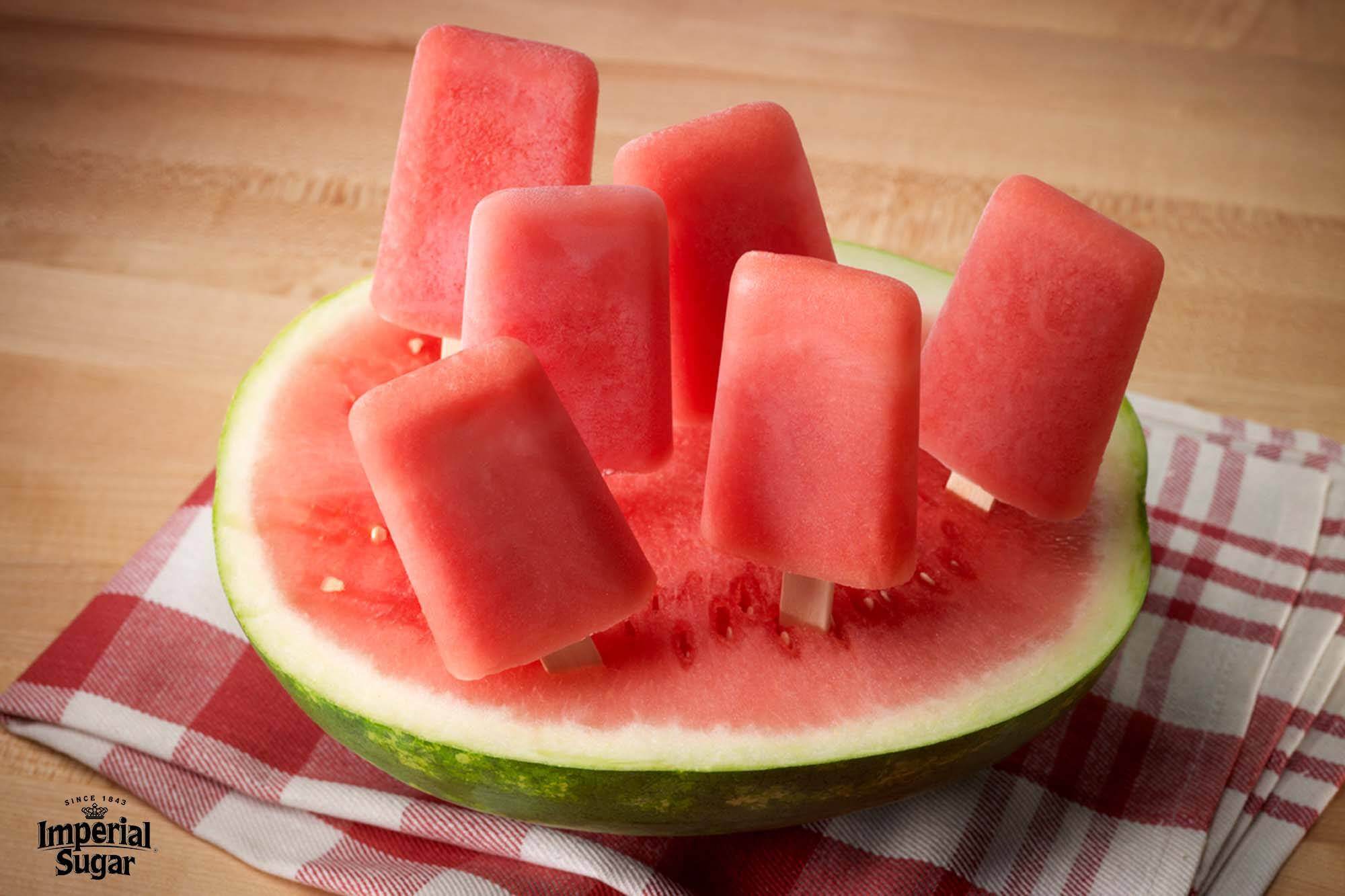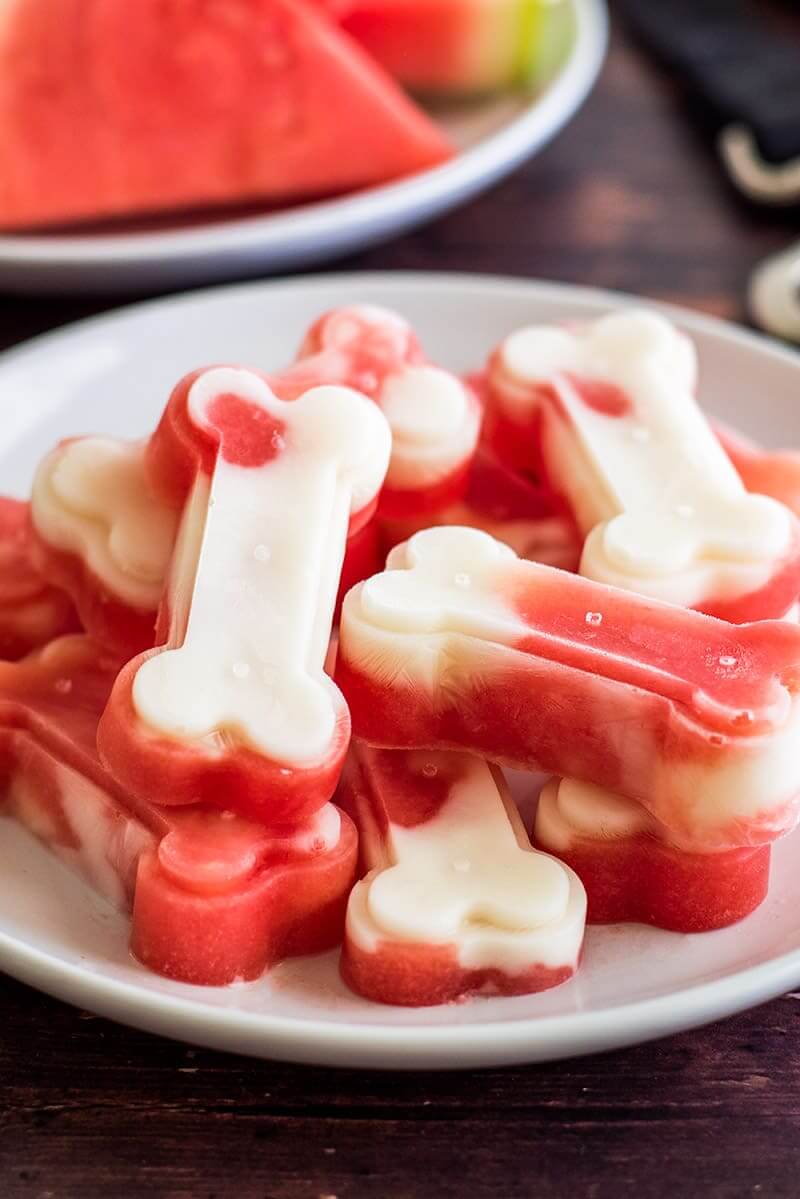With summer in full swing, many of us are reaching for a favorite seasonal snack, watermelon! Its hydrating properties and vibrant flavor make it a favorite among humans during the warmer months. As dog owners, it’s only natural to wonder whether our furry friends can enjoy munching on this succulent fruit. Can dogs eat watermelon? Let’s dive into the delicious world of watermelon for dogs and uncover why it’s more than just a tasty indulgence; it’s a tail-wagging, tongue-lolling delight!
Can Dogs Eat Watermelon?

Absolutely, YES! Dogs can eat watermelon and enjoy some fantastic health benefits. This juicy fruit is not only safe for our furry friends but can also be a delicious and nutritious treat. Just remember to remove the seeds and the rind before sharing, and you’re good to go.
So, go ahead and treat your pup to a refreshing bite of watermelon – they’ll likely thank you with wagging tails and happy faces!
What Are the Benefits of Feeding Watermelon to Dogs?
Watermelon can be a healthy and tasty treat for our lovely dogs! Here are a few awesome benefits of feeding watermelon to your pup:
High Water Content, Promoting Hydration
One awesome thing about giving watermelon to our furry friend is its crazy high water content; I’m talking about 90%!
Just like us, our pups need to stay properly hydrated for tip-top health. Especially on those scorching summer days or after some intense playtime, tossing them a few watermelon bites can be a tasty trick to up their overall fluid intake. It’s like a delicious, hydrating treat to keep them cool and feeling great!
Low in Calories and Fat, Suitable for Weight Management
Watermelon is a champ when it comes to being low in calories and fat. Do you know how watching those calories is key for keeping our pups in tip-top shape?
Well, watermelon steps up to the plate as a fantastic treat option. If your furry buddy is on a bit of a diet journey or has a tendency to pack on a few extra pounds, this juicy fruit is a great treat. It satisfies their sweet tooth without sneaking in any extra baggage for their waistline. It’s a smart choice for their overall weight management!
Rich in Vitamins and Antioxidants, Supporting Overall Health
Watermelon isn’t just a refreshing treat; it’s a nutritional powerhouse! Packed with essential vitamins like A and C, this juicy delight goes beyond quenching thirst.
These vitamins aren’t just fancy; they’re superheroes for your dog’s immune system, ensuring it’s up and running like a well-oiled machine. And that’s not all. The A and C tag team also does wonders for our pups’ skin and coat, giving them that healthy, shiny glow.
But wait, there’s more! Enter antioxidants, with lycopene taking center stage. These little warriors are like the bodyguards of the fruit world. Lycopene, found in watermelon, plays a crucial role in battling those pesky free radicals, those troublemakers that can cause all sorts of chaos in our dog’s body.
Safety Considerations When Feeding Watermelon to Dogs

Now that we’ve delved into the numerous benefits of feeding watermelon to our furry friend, it’s crucial to shift our focus to safety considerations. While watermelon is generally a safe and healthy treat for dogs, a responsible pet owner should be aware of a few precautions.
Potential Choking Hazards from Seeds and Rind
While watermelon flesh is generally safe for dogs, caution should be exercised with seeds and the tough outer rind. Seeds pose a choking hazard and, in some cases, can cause intestinal blockages. Therefore, it’s crucial to remove all seeds before offering watermelon to your dog. Opt for seedless varieties whenever possible.
Moderate Sugar Content, Requiring Controlled Intake
Although watermelon is relatively low in natural sugars compared to other fruits, moderation is key.
Too much sugar can lead to digestive upset, including diarrhea. It’s essential to control the portion size and not make watermelon a staple in your dog’s daily diet. Monitor their response, especially if they have a sensitive stomach.
Individual Sensitivities and Health Conditions
Every dog is unique, and individual sensitivities may vary. Some dogs may have allergies or sensitivities to certain foods, including fruits.
Before introducing watermelon into your dog’s diet, observe how they react to a small amount. Additionally, if your dog has pre-existing health conditions such as diabetes, consult with your veterinarian to determine whether watermelon is a suitable treat.
How to Safely Feed Watermelon to Your Dog?
Ensuring our furry friend enjoys this delicious treat without harm requires a thoughtful approach; here’s a step-by-step guide to help!
Step 1: Remove Seeds and Rind Before Serving
Let’s prep that watermelon. take a little extra time to make sure you get rid of all those seeds and the tough rind. We want to avoid any potential choking hazards for our four-legged pals.
Trust me, your dog will thank you for it. Now, once you’ve done that, what you’re left with is the juicy, fleshy goodness that your dog will absolutely love.
Step 2: Cut Watermelon into Small, Bite-Sized Pieces
Cut it into small, manageable pieces instead of giving your dog a large slice of watermelon. Why, you ask?
Well, smaller pieces are way easier for your dog to handle. Imagine trying to nibble on a watermelon the size of your face, not exactly a walk in the park, right? Cutting it up into more manageable bits makes it a breeze for your pup to enjoy without any wrestling match.
But wait, there’s more to it than just convenience. Controlling the size of the pieces helps you keep an eye on your dog’s overall watermelon intake. We all know how some dogs can get a bit overenthusiastic when it comes to treats. By going small, you’re dodging any potential tummy troubles and ensuring that the watermelon snack remains a delight, not a digestive disaster.
Step 3: Start with Small Amounts and Monitor Your Dog’s Reaction
Be a responsible snack dealer for your furry buddy. Now that you’ve got those cute, bite-sized watermelon pieces ready, it’s time to play it safe.
Start slow; introduce the watermelon to your dog’s menu with a small amount. I’m talking a nibble, not a feast. Why? Well, just like us, dogs might have different reactions to new foods. We want to make sure your pup’s tummy is on board with the watermelon party.
Watch your dog like a hawk, not in a creepy way; just pay attention! Check for any signs of allergies or digestive discomfort. It’s like being a detective but with treats if your pup seems all good and shows no weird reactions, awesome! You’re on the right track.
Here’s the golden rule, if everything’s smooth sailing, you can gradually increase the portion size. But remember, moderation is key. We’re aiming for happy tails, not upset tummies. So, take it slow, observe your dog’s reaction, and let the watermelon festivities continue in a way that keeps everyone wagging and healthy.
Step 4:Offer Watermelon as an Occasional Treat, Not a Regular Part of Their Diet
As much as your pup might give you those irresistible puppy eyes for more watermelon, set some boundaries for their own good.
Yes, watermelon is a delicious and hydrating treat, but it’s not meant to be the main course on our dog’s menu. Treats, including this juicy wonder, should be like the sprinkles on the cupcake of their diet, a delightful addition, but not the whole cake.
Think of it this way: your dog’s regular meals are like the superhero, providing all the essential nutrients they need for a healthy, wag-worthy life. Watermelon? Well, that’s the sidekick, there to add some fun and flavor but not take over the show.
Offer watermelon as an occasional treat, not a daily feast. Moderation is the name of the game. Your pup’s belly and overall well-being will thank you for maintaining that balance. So, while the joy of sharing watermelon with your furry friend is awesome, keep it in the treat zone, and let their regular meals stay the superhero of the day.
4 Simple Watermelon Dog Treats!
Here are four simple watermelon dog treats that your furry friend might enjoy. Remember to remove any seeds and rind before serving, as they can be a choking hazard for dogs.
Frozen Watermelon Cubes

- Cut seedless watermelon into small, bite-sized cubes.
- Place the cubes on a tray and freeze them.
- Once frozen, offer these refreshing treats to your dog on a hot day.
Watermelon Popsicles

- Blend seedless watermelon until smooth.
- Pour the watermelon puree into ice cube trays or molds.
- Insert dog-friendly sticks (like rawhide sticks) into each compartment.
- Freeze and serve as a cool, icy treat.
Watermelon and Yogurt Bites

- Mix pureed watermelon with plain, unsweetened yogurt.
- Spoon small dollops onto a parchment-lined tray.
- Freeze until solid.
- Serve these yogurt and watermelon bites as a tasty, chilled snack.
Watermelon and Mint Treats

- Cut seedless watermelon into small cubes.
- Chop fresh mint leaves finely and sprinkle them over the watermelon cubes.
- Toss gently to coat the watermelon with mint.
- Serve this watermelon and mint mix as a refreshing and flavorful treat.
Always be mindful of the portion sizes, and if you’re introducing new treats to your dog’s diet, monitor them for any adverse reactions. Additionally, consult with your veterinarian to ensure that watermelon is a safe and suitable treat for your specific dog, especially if they have any dietary restrictions or health issues.
Can Dogs Eat Watermelon – Bottom Line:
The answer to the question “Can dogs eat watermelon?” is a resounding yes. Watermelon can be a healthy and refreshing treat for our lovely dogs, offering hydration, essential vitamins, and a delightful taste experience. However, responsible pet ownership involves being mindful of potential hazards, such as seeds and rind, and ensuring that treats are given in moderation.
As with any dietary changes, it’s advisable to consult with your veterinarian before introducing watermelon or any new food into your dog’s diet, especially if they have underlying health conditions.
By following safety guidelines, removing seeds and rind, and monitoring your dog’s response, you can safely share the joy of watermelon with your canine companion.
So, this summer, treat your furry friend to the goodness of watermelon and watch them revel in the deliciousness of this healthy and hydrating snack.





You are so interesting! I don’t believe I’ve read something
like this before. So great to find somebody with a few unique thoughts on this subject.
Really.. thanks for starting this up. This web site is
something that is needed on the internet, someone with a bit
of originality!
I want to to thank you for this good read!! I definitely enjoyed every bit of it.
I’ve got you book marked to look at new stuff you post…